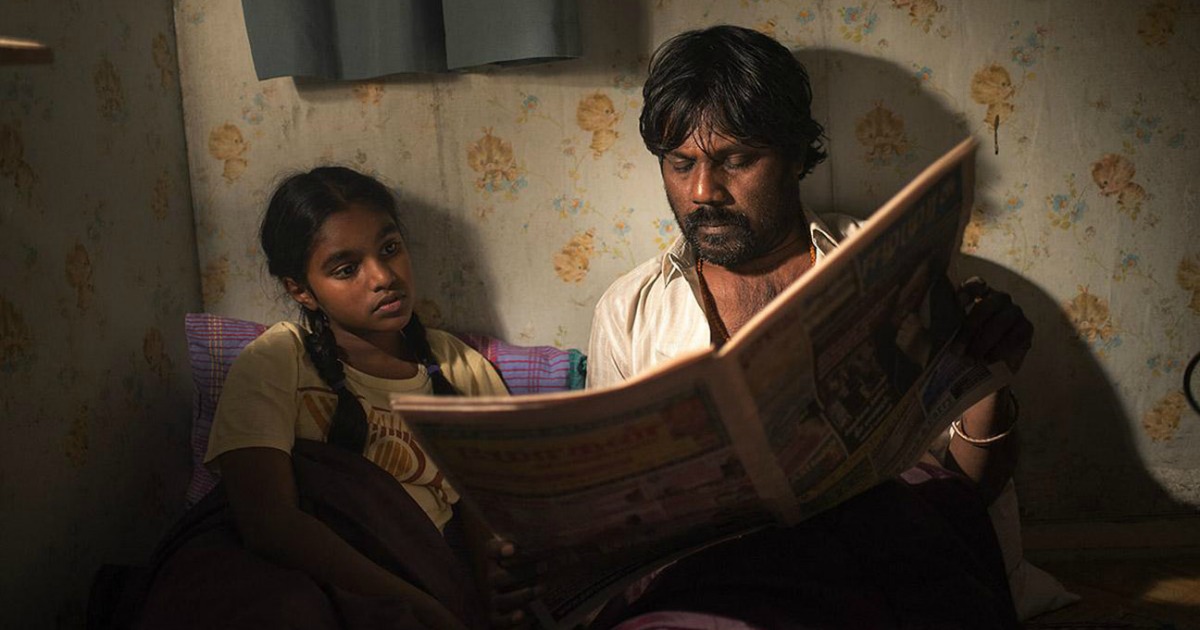
As we head ever closer to this year’s Cannes Film Festival (one of the most intriguing lineups in a handful of years, I will add), the 2015 Cannes lineup feels like a distant memory. However, arguably the festival’s biggest debut, winner of its highest prize the Palme d’Or, is finally arriving in theaters stateside.
Entitled Dheepan, this Tamil-language drama comes from beloved filmmaker Jacques Audiard (A Prophet) and shocked the festival last year by stealing the biggest prize seemingly out of nowhere. The most prestigious of awards on the festival circuit, the Palme d’Or brings with it not just expectations but expectations of greatness that few films have the ability to live up to. But thankfully, decide a problematic final sequence, Audiard’s film does exactly that.
Again, a Tamil-language picture, Dheepan introduces us to a man who will take on the identity of “Dheepan” (played brilliantly by Antonythasan Jesuthasan) a former soldier who is looking to find a new home in France after the Sri Lankan civil war. With Yalini (Kalieaswari Srinivasan) and Illayaal (Claudine Vinasithamby) posing as his wife and child respectively, the makeshift family take on false identities and move to a suburb in northern Paris prone to gang violence.
These performances are the film’s greatest attribute. The story itself is inherently full of dramatic tension and weighty themes about the modern immigrant experience and one’s inability to leave his or her past in the actual past, but the strength of the picture comes directly from the naturalistic and moving performances. Jesuthasan takes on much of the weight as the lead character, and while his performance is singularly great, the nuances seen within the character come out best when he’s interacting with his new “family.” There’s a lived in quality to each performance here, but that’s crystal clear in his turn, particularly as the slow changes in identity make their way to the front. Srinivasan’s performance is equally as superb, with Audiard’s camera focusing on her and her new “husband’s” faces as they make their way through the new world they find themselves surrounded by. Be it trying to make a life with two new people or take stock of a situation in a crime-filled suburb that may get you killed in an instant, each of these performances (including the final lead Vinasithamby) is rooted in the neo-realist style despite a finale that seems more influenced by genre cinema than the ground level dramas that leave their imprint on the first two acts.
In that final act the film does admittedly fall apart. Where the previous two acts build up a narrative of changing identities within the immigrant experience, the film goes full action picture when Dheepan takes matters into his own hands. This sudden burst of violence, while not entirely rare (there are spurts of violence throughout the film), feels entirely out of place within a film that is far more interested in the tactile, human experiences of these characters. Even the secondary characters like Vincent Rottiers’ Brahim feel as though they have truly lived in lives, and while this set piece makes up maybe one eighth of the film it is such a decidedly stark shift in style that it comes off as simply cartoonish.
That said, the film itself as a whole is remarkably crafted. Despite falling into sweeping theatrics in the final moments, this is a picture of deeply rich humanity. Aesthetically, the film is gorgeous. Audiard’s camera is rarely attention grabbing, instead allowing for the faces of our characters to do the heavy lifting. It’s an understated movie that thrives on moments of human interaction that Audiard plays in a minor key. The cinematography here is also quite great, with earth tones filling the frame, setting a world that feels entirely real despite bursts of melodrama the film is prone to. There is something to be said for this type of realism that Audiard is working through, a realism that is at once entirely tactile and yet not afraid to turn the immediacy of each moment into its own take on melodrama. It’s a large task Audiard takes on here, and thankfully it pays off in spades.



